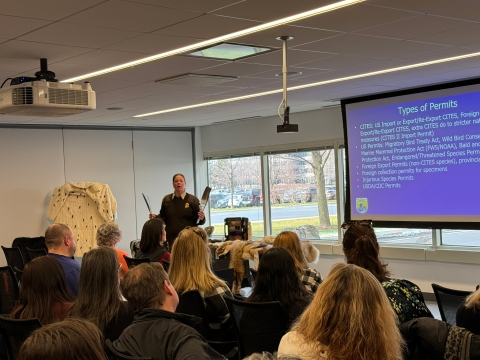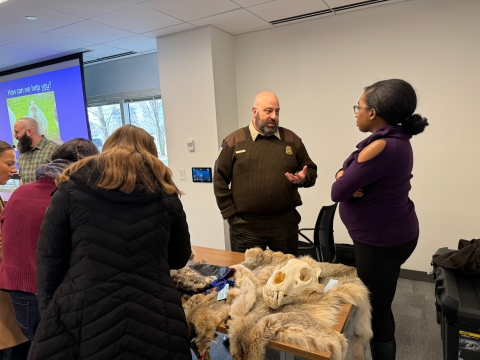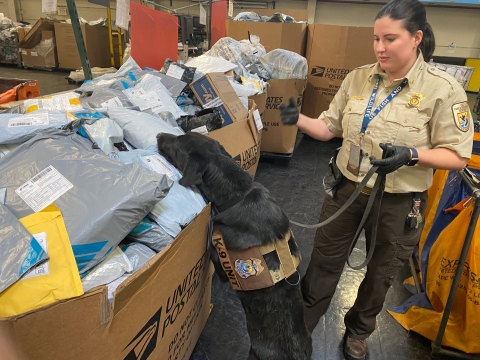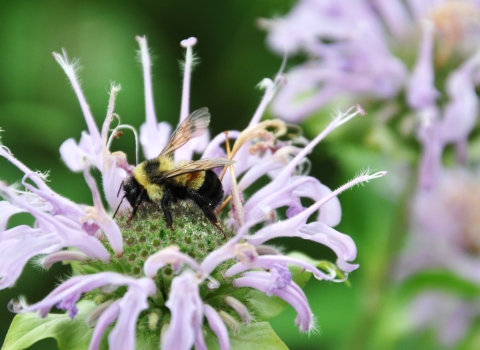We at the U.S. Fish and Wildlife Service work to protect wildlife by enforcing international and domestic wildlife laws and preventing poaching and wildlife trafficking. Our wildlife inspectors are dedicated professionals on the front line of wildlife protection and serve as a model for the rest of the world. Unlike many countries that lack dedicated wildlife authorities, the United States has a system in place to combat illegal wildlife trafficking. However, their work emphasizes the need for greater public education about illegal wildlife trade, as many people remain unaware of its complexities and consequences.
Daily responsibilities and challenges
The daily responsibilities of a wildlife inspector are varied and demanding. Inspectors facilitate the legal trade in wildlife, while stopping illegal activities. This involves examining paperwork and permits, as well as conducting physical inspections at various points of entry, such as international airline passenger terminals, mail branches, cargo facilities and border crossings. Inspectors handle a wide array of items, from hunting trophies and zoo animals, to personal effects and tourist souvenirs.
Inspectors also proactively work to halt illegal wildlife trade. This includes identifying and intercepting smuggled goods, falsified documents and illegally shipped wildlife products. Their efforts prevent these items from penetrating deeper into the U.S. market, thereby protecting vulnerable wildlife populations.
Why we serve
The passion for justice and wildlife conservation drives many to become wildlife inspectors. Kelly Ishmael, a senior field wildlife inspector, recalls an incident where she removed an elephant ivory bracelet from a woman at a checkpoint. The woman, who had bought the bracelet at a thrift store, was unaware that it was illegal. This role aligns with Ishmael’s strong sense of ethics and desire to protect wildlife from exploitation.
Outreach and education
Outreach is an essential aspect of a wildlife inspector's job. Engaging with the public, especially school aged children, helps foster a love for wildlife that can last a lifetime. Children are eager to share stories about wildlife and often reveal interesting details about their own experiences. Adult outreach is equally important and offers a platform to discuss wildlife conservation, laws and the fascinating intricacies of wildlife trade.
Teachers who are interested in educating their students about wildlife trafficking benefit from outreach programs as well. Commonly trafficked items include peacock and macaw feathers, crocodile skin wallets, and belts. Inspectors also educate the public about the dangers of mammal bushmeat trafficking and encourage them to look up information on the international trade of species to stay informed.
Pathways to becoming a wildlife inspector
Aspiring wildlife inspectors can pursue a bachelor's degree in biology, wildlife biology, criminal justice, or a related field. Relevant work experience in law enforcement or natural resources can also be beneficial. Learn more about this career path.
Key skills for success in this field include patience, a proactive attitude and strong listening abilities. Inspectors must be patient when dealing with diverse groups and willing to actively seek out and confront illegal wildlife trade. Effective listening can uncover valuable information that aids in advancing cases.
Personal journeys and experiences
For many inspectors, the journey is a long and rewarding one. Ryan Colburn, a supervisory wildlife inspector, reflects on his nearly two-decade-long career with pride. "This isn't just a job; it's about protecting our wildlife heritage for future generations," he says. "We speak for those that don’t have a voice." Colburn's dedication and passion for wildlife conservation inspire his daily efforts and those of his team.
This year also marked the retirement of Beans, a beloved canine unit who played a key role in detecting smuggled wildlife products. Beans’ keen senses and commitment helped intercept numerous illegal items, setting a high standard for all canine units.
The impact and legacy of wildlife inspectors
Wildlife inspectors in the United States have been paving the way for global wildlife protection efforts. Their tireless work, combined with advancements in technology and public education, is making a significant impact on curbing illegal wildlife trade. Despite the challenges, these dedicated professionals continue to protect our wildlife, ensuring that future generations can enjoy the beauty and diversity of the natural world. We are proud to raise awareness of the key role they play in safeguarding wildlife, educating the public, and encouraging the next generation of wildlife inspectors.







